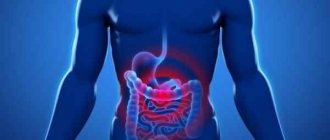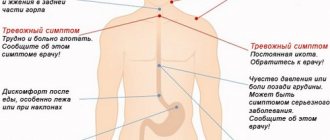Heaviness in the stomach is the first sign that problems with the digestive tract are beginning to progress in the body. Absolutely anyone can encounter this symptom, regardless of the person’s age category and gender.
- Etiology
- Symptoms
- Diagnostics
- Treatment
- Prevention
The main causes of discomfort in the stomach are gastrointestinal diseases and poor nutrition, but there are other predisposing factors. In addition to the main manifestation, the clinical picture will include a large number of other manifestations, including nausea and vomiting, belching and heartburn, as well as impaired bowel movements.
To identify the etiological factor, they often resort to an integrated approach, which is why the diagnosis will consist of a physical examination and laboratory and instrumental examinations. Conservative methods often prevail in therapy.
Causes of heaviness in the stomach after eating
When a symptom such as heaviness in the stomach appears, the reasons for the development of this problem can be very diverse. The most common adverse factors are:
- Diet errors. For example, if a person consumes an excessive amount of fatty foods, fried foods, semi-finished products, which contain a large number of preservatives, flavor enhancers and other chemicals that negatively affect the functioning of the digestive organs;
- Wrong diet. It disrupts the normal functioning of the digestive system, when the gastrointestinal tract is forced to work under heavy overload. This is, for example, alternating long periods of fasting with excessive food intake, night meals;
- Insufficient chewing of food, haste when eating. Poorly chewed food enters the stomach in large pieces, making it more difficult for the organ to digest it, and the digestion process takes a lot of time. This leads to a feeling of heaviness in the stomach, as well as to the appearance of other unpleasant clinical manifestations;
- Consumption of expired, stale, low quality products. In this case, there is a high risk of developing food poisoning with all the manifestations characteristic of this situation, which negatively affect the functioning of the gastrointestinal tract and can be dangerous to health and life;
- Lack of physical activity. It is known that physical activity stimulates the functioning of the digestive system; lack of exercise has an adverse effect on the functioning of the stomach and intestines, and on the condition of the entire body as a whole;
- Lazy stomach syndrome (dyspeptic disorders). The development of this problem is caused by both poor nutrition and congenital anomalies of the gastrointestinal tract, as well as genetic disorders;
- Pregnancy. In the process of bearing a child, the female body undergoes a number of serious changes. These are, first of all, changes in hormonal levels, the development of toxicosis, compression of the peritoneal organs as the fetus grows;
- Adolescence, when various changes occur in the child’s body;
- Psychological problems, in particular, excessive emotionality, anxiety, tendency to stress and worry;
- Addiction to alcohol and cigarettes;
- Long-term use of certain types of medications, and, as a result of this, the development of dysbiosis and difficulty digesting food.
Treatment
Elimination of stomach discomfort should only be done under the supervision of a physician, since self-treatment can only worsen the situation.
In the vast majority of cases, therapy is limited to conservative methods, including:
- taking medications;
- maintaining a gentle diet;
- use of traditional medicine recipes.
Drug treatment can be aimed at using:
- antibacterial agents;
- antacids and prokinetics;
- enzyme substances;
- antispasmodics and PPIs;
- antidiarrheal and other medications to eliminate associated symptoms.
All recommendations regarding nutrition, sample menus and methods of preparing dishes, as well as a list of permitted and prohibited ingredients are provided by a gastroenterologist or nutritionist.
Good results can be achieved using alternative medicine techniques. The list of the most effective folk remedies for heaviness in the stomach includes the following medicinal herbs:
- calendula and St. John's wort;
- yarrow and mint;
- chamomile and fennel;
- anise and lemon balm;
- tansy and rosehip.
The above medicinal plants can be used both in their pure form and as an herbal collection for preparing decoctions and infusions. It is not prohibited to add honey to medicinal drinks.
It is worth noting that all of the above treatment measures will help neutralize only the main symptom, and not the root cause of the disease. To get rid of the etiological factor, an individual approach is used.
https://youtu.be/mriO8DyaG1E
What diseases can lead to the development of the problem?
The most common cause of heaviness in the stomach after eating food is an unhealthy diet, bad habits and poor diet. However, if a problem bothers a person for a long period of time, it is possible that some pathologies in the body led to its development. The most likely causes of diseases include:
| Disease | Characteristic |
| Gastritis | The pathology is inflammatory in nature and manifests itself as a result of the systematic negative impact of unfavorable factors (mechanical, chemical, thermal, bacterial damage) on the gastric mucosa. As a result of such exposure, the epithelium is injured, clear lesions appear on it, and the functionality of the organ is lost. |
| Peptic ulcer | The disease is accompanied by deep damage to the gastric mucosa, resulting in pronounced painful ulcers appearing on its walls. Most often, the disease develops against the background of untreated gastritis. The patient experiences very unpleasant sensations. This is a pain syndrome that occurs immediately after eating, or a few hours after a meal, or during fasting. There is a urge to vomit and stool disturbances. |
| Pyloric stenosis | The opening connecting the stomach and intestines is called the pylorus. Normally, the diameter of this opening is quite wide, which allows food to move freely from the stomach to the intestines. With the development of certain diseases, such as malignant or benign tumors, ulcers, the pylorus lumen becomes narrower. As a result, food moves more slowly and stagnates, which leads to a feeling of heaviness in the lower abdomen |
| Liver pathologies | If the cause of heaviness in the stomach is liver pathology, the patient faces the following problems: yellowness of the skin and sclera, a feeling of fullness in the lower abdomen, accompanied by discomfort, deterioration of the condition, the appearance of specific rashes on the skin, darkening of stool and urine. |
| Neoplasms in the stomach | The appearance of heaviness in the abdomen is caused by the formation of malignant or benign tumors in the stomach cavity. The most dangerous situation is the development of carcinoma. When tumors appear, the patient is worried about such complaints as a feeling of rapid satiety, heaviness, pain, deterioration in general condition, loss of body weight, even to the point of exhaustion of the body. |
| Inflammation of the pancreas | This organ produces a large number of enzymes that make up the gastric juice. With the development of inflammation, the secretory function of the pancreas is lost, and accordingly, the composition of the gastric juice changes. Food is less easily digested and stagnates in the stomach, leading to a feeling of heaviness. |
| Parasitic infestations | Worms and other parasites that penetrate the human body, in particular the digestive tract, damage their tissues. As a result, digestive function is lost, food stagnates in the stomach or intestines for a long time. |
Expert opinion
Shoshorin Yuri
General practitioner, site expert
All the diseases mentioned above pose a serious danger to the patient's health. Heaviness in the stomach is a characteristic symptom of all these pathologies, which means that if the patient constantly feels fullness and pain, it is necessary to undergo an examination as soon as possible and identify the cause of the problem.
Treatment regimen
What medicine will help get rid of the problem?
If heaviness in the stomach is caused by dysfunction of the digestive system or the development of an inflammatory disease of the digestive organ, the doctor first of all prescribes drugs that relieve the main cause of the pathology. Treatment of gastric heaviness involves the use of such effective drugs:
Disruptions in the digestive process cause pain and bloating.
- "Mezim";
- "Festal";
- "Smecta";
- "Panzinorm";
- "Pancreatin";
- "Motilium";
- "Motonium";
- "Omez";
- "De-Nol";
- "Gastal";
- "Ranitidine".
The importance of diet
In addition to drug treatment, it is necessary to adjust the diet, give up heavy, fried, smoked and too salty foods, replacing them with dietary dishes prepared in a gentle way. It is not recommended to eat heavily in the evenings. Dinner should be easy to digest so that the body can rest at night. Often heaviness in the stomach goes away when a person begins to take enough fluid. Water promotes the normal secretion of gastric and intestinal secretions, due to which digestion improves and discomfort goes away.
Traditional medicines
Lemon water can help relieve nausea.
Unconventional remedies that can be done at home also effectively combat signs of heaviness in the stomach. But before taking such a medicine, you need to consult a doctor and agree on a treatment regimen with him. Folk remedies will not affect the root cause of the severity, but will help relieve discomfort and unpleasant symptoms. Here are some effective methods:
- If heaviness in the stomach is accompanied by heartburn and sour belching, it is recommended to dilute 1 tsp in 1 glass of water. soda, and drink all the liquid. After 10-15 minutes. the condition will improve.
- Nausea and a lump in the stomach go away if you make a lemon drink. To do this, squeeze the juice out of half a lemon and then dilute it in a glass of water. Add a spoonful of honey to the prepared liquid.
- If the discomfort is caused by a heavy dinner and drinking alcohol, you can remove the discomfort in the stomach with the help of herbal tea, for the preparation of which mint, chamomile, calendula and yarrow are mixed and brewed in equal proportions.
- Digestive disorders caused by stress and nervous tension can be normalized with a pharmaceutical tincture of propolis.
Possible complications
The appearance of a feeling of heaviness is a symptom that cannot be ignored. Stagnation of food in the stomach leads to damage to the walls of the organ and the development of pathologies such as erosion, gastritis, ulcers, and the appearance of neoplasms.
If the severity develops against the background of gastrointestinal diseases, the lack of therapy may lead to an exacerbation of these pathologies, their transition to a more advanced and complex form.
Diagnostic methods
In addition to interviewing the patient, the doctor uses the following diagnostic methods:
- FGDS is an examination of the digestive system using an endoscope. During the procedure, the doctor assesses the condition of the organs and their walls, identifies the presence of damage, determines their location and size;
- Gastrochromogastroscopy – allows you to evaluate the secretory function of the stomach. The procedure is performed using an endoscope and special contrast dyes;
- Microscopic examination of the affected tissue to determine the extent of damage and possible causes that led to the problem;
- pH-metry to determine the acid composition of gastric juice and the degree of activity of these acids;
- Endovideo examination using a special probe equipped with a video camera. This method allows you to assess the condition of all parts of the gastrointestinal tract, identify areas of damage, and assess the extent;
- Fiberile colonoscopy for examination of the intestines. Allows you to evaluate organ motility and identify affected areas;
- Laboratory tests (examination of stool for the presence of blood, worm eggs, parasitic infections, blood and urine tests for the presence of inflammation and bacterial infections);
- Ultrasound of the digestive system to determine possible pathologies that can lead to heaviness in the abdomen.
Recommendations for treating heaviness in the abdomen
If there is a pronounced feeling of fullness and heaviness in the abdomen, it is necessary to undergo a course of treatment. In addition to taking medications prescribed by the doctor, the patient must follow special recommendations, such as:
- Drink plenty of fluids. It’s good to drink 1 glass of warm water immediately after waking up. This will “wake up” the digestive system and prepare it for work. During the day, you should also not forget about water. It is recommended to consume at least 2 liters. clean water per day;
- Lifestyle correction. You need to give up bad habits as soon as possible and accustom yourself to physical activity. It is important not to lie down immediately after eating (at least in the first 30 minutes after the meal), but to engage in moderate physical exercise. This stimulates the functioning of the gastrointestinal tract, facilitates the process of digesting food;
- Excluding foods that are difficult to digest;
- Eating according to the established daily routine, at the same time;
- Have dinner 3-4 hours before bedtime;
- Eat food in small portions, chewing each piece thoroughly;
- Eating should take place in a calm atmosphere, without haste or distractions;
- Refusal of strict diets if there are no appropriate indications;
- Complete rest.
Severity of gallbladder pathology
Bitterness in the mouth combined with belching, pain, nausea and vomiting may indicate inflammation of the gallbladder. This is a small organ located next to the liver. It is needed for the accumulation of bile. Cholecystitis occurs in acute and chronic forms. Every year the number of patients with this disease increases.
Almost always this pathology is combined with cholelithiasis. The causes of cholecystitis are:
- congenital anomalies;
- helminthic infestation (opisthorchiasis, fascioliasis);
- giardiasis;
- dyskinesia;
- diet violation;
- alcoholism.
The presence of nausea and heaviness in the stomach most often indicates chronic inflammation. They are caused by swelling, penetration of microbes and impaired motor function of the organ. Other symptoms of chronic cholecystitis are bloating, lack of appetite, low-grade fever, belching, bitter taste in the mouth, pain in the back or right hypochondrium. The appearance of nausea and heaviness in the stomach is due to stagnation of bile and indigestion. Exacerbation of the disease can be caused by drinking alcohol or eating spicy foods.
Medications
| Name | Description | Admission rules | Price |
| No-shpa | Prescribed for one-time manifestations of heaviness in the stomach. Helps eliminate spasms and pain, relaxes the muscles of the digestive organs, and facilitates the process of moving food. | 1-2 tablets 2-3 times a day. One-time dose (in some cases you can take 1-3 days). | 230 rub. |
| Motilium | Promotes the rapid movement of food through the esophagus, stimulates the process of contraction of the walls of the gastrointestinal tract, and eliminates nausea. | 10 MG 3-4 times a day. Duration -3-5 days. | 800 rub. |
| Ranitidine | They neutralize the effect of hydrochloric acid and reduce the process of its production. Prescribed if heaviness after eating is accompanied by heartburn. | 0.15-0.3 gr. 2 times a day. Duration -7-10 days. | 65 rub. |
| Rennie | They have a preventive, protective effect, enveloping the walls of the stomach and protecting them from negative effects. | 1-2 tablets several times a day (if necessary). The maximum daily dose is 10 tablets. The duration of treatment is determined individually. | 300 rub. |
What to do first
After a heavy meal, measures should be taken immediately. The faster you help yourself, the easier it will be to cope with this condition. Do not rush to drink pharmaceutical drugs, there are more natural measures.
Stop eating
This also applies to those products that are supposed to improve the condition, for example, fruits. They should not be consumed on a full stomach as they cause fermentation. Then bloating and flatulence are guaranteed. You can drink water. It is useful to add a little lemon juice to it. But no alcoholic, carbonated or sweet drinks!
- Homemade pizza in the oven
- Moscow ASC-DTI - what it is and what organization it is. Registered letters, notices with the code Moscow ASC-DTI
- How to smoke mackerel in a hot smoker correctly. Hot smoked mackerel recipes
Move
The ideal option is to go for a walk. Fresh air activates all processes in the body, including digestion. Fatigue and drowsiness will go away, your mood will improve. Light physical activity in the form of walking will help the passage of food through the intestines. You can dance.
Chew chewing gum
When chewing, saliva and gastric juice are reflexively released. The more enzymes supplied, the faster food is digested.
Drink ginger drink
Tea made from fresh ginger root is a good remedy for overeating. It stimulates digestion, suppresses gas formation and relieves cramps. Grate a small piece of ginger, pour boiling water over it, and let it brew for a few minutes.
Food
| Allowed | Forbidden |
|
|











